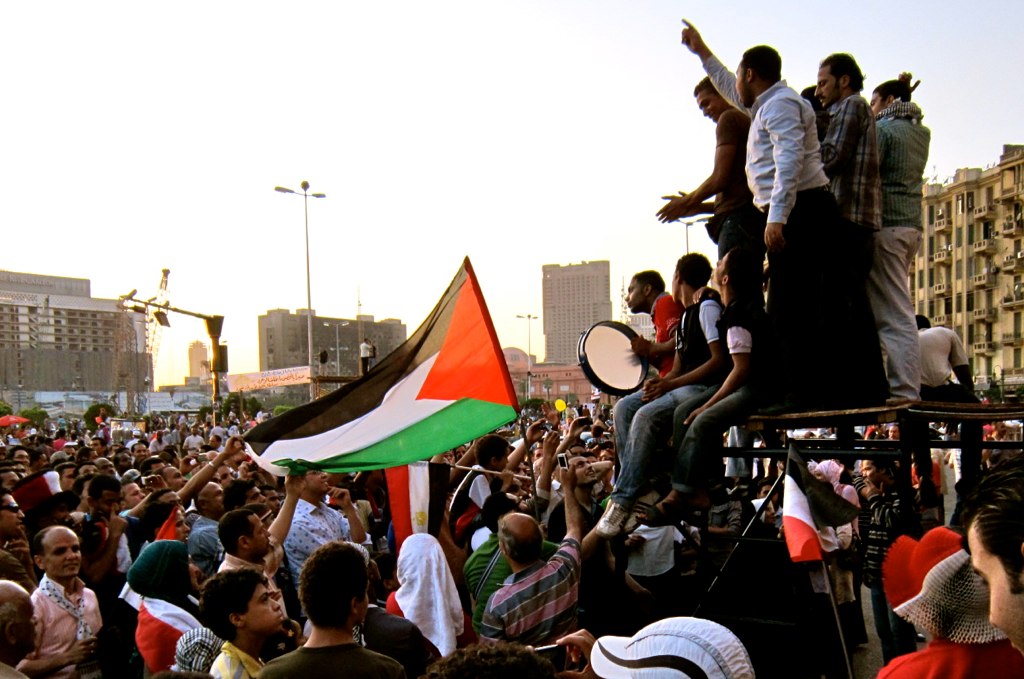Dismantling myths about the BDS movement and McGill BDS
Sam Paterson*
U3 Arts
*The writer of this letter has elected to use a pseudonym citing concerns of personal safety and of mobility.
Time after time, we see that any motion regarding Palestine is immediately opposed and shut down at McGill. This time was no different. Even before the BDS motion for the upcoming SSMU GA was even realized, a ‘Vote No’ Facebook event page was established. The same arguments are always raised: the motion is anti-Semitic; the motion marginalizes students on campus; the motion aims to let only a small number of students take control of SSMU executive power; the motion has to do with an issue that is irrelevant to McGill students; or the motion is is divisive and has no place at McGill as it doesn’t affect McGill students.
There are many myths surrounding Boycott, Divestment and Sanctions (BDS): its intents, and its goals. The proposed BDS motion, which will be brought forth at the February 22 SSMU Winter 2016 General Assembly is likewise shrouded in mythology. Let me refute the misinformation that the no campaign is spreading.
First, I will explain what exactly the BDS motion is. Then I will address the vote no campaign’s press release and try to set the record straight.
What is BDS?
In 2005, over 170 civil society organizations in Palestine came together to call for BDS. These actions were modelled after the historical ‘boycott, divestment and sanctions’ movement used against apartheid South Africa. With regards to the current Palestinian reality, the official BDS website states that “these non-violent punitive measures should be maintained until Israel meets its obligation to recognize the Palestinian people’s inalienable right to self-determination and fully complies with the precepts of international law.”
The economic ‘Boycott’ targets any goods produced within illegally occupied Palestinian territories – whether they be Israeli or non-Israeli. Sodastream, for example, has been boycotted: it has a factory in an illegal settlement in the West Bank. The ‘Divestment’ aspect aims to have groups and institutions divest their financial holdings from any companies that profit from the illegal occupation of Palestinian lands. Lastly, BDS calls for international sanctions to be imposed on Israel accruing to its government’s repeated, and blatant disregard for and noncompliance with international law.
The BDS call outlines Israel to meet three demands. These demands are outlined in the proposed GA BDS motion as follows:
1) Ending its occupation and colonization of all Arab lands captured in 1967 and dismantling the Wall;
2) Recognizing the fundamental rights of the Arab-Palestinian citizens of Israel to full equality; and
3) Respecting, protecting and promoting the rights of Palestinian refugees to return to their homes and properties as stipulated in UN resolution 194.
The GA motion, if passed, would mandate “SSMU support campaigns associated with the BDS movement through the office of the VP External, including the campaign to divest from corporations complicit in the occupation of the Palestinian territories.” It would also mandate the SSMU president to lobby to Board of Governors to divest from companies that profit from the illegal Israeli occupation, and to implement an investment screen that would bar the University from investing in any similar companies in the future.
What does the Opposition say?
I will now address some of the no campaign’s arguments and explain why they are misinformed.
SSMU and McGill BDS
The no campaign says it “ardently [opposes] the co-opting of SSMU, the McGill student body, and the daily lives of all McGill students by a single narrative, whose proponents have failed to impose it upon the university twice in the last 18 months.”
There are Palestinian students at McGill, and McGill is invested in companies that profit from the illegal Israeli occupation of Palestinian territories – this issue very directly impacts McGill students.
The GA is a forum for all students to bring forth motions, and it is up to the student body to vote on this motion. A group of students bringing forth a motion that answers the call of an oppressed people is not “co-opting” SSMU. In fact, the SSMU Constitution states that “the SSMU commits to demonstrating leadership in matters of human rights [and] social justice.” Not to mention that the SSMU Equity Policy states that “the SSMU – an organization working with individuals, in groups, within organizations, and across a wide social and political context – shall promote a functional and anti-oppressive environment.”
The SSMU has a mandate to be political – it took a stand against apartheid South Africa, and it should take a stand today against the Israeli occupation and continued violation of Palestinian human rights.
Furthermore, BDS is a relatively young movement at McGill. The McGill BDS Action Network is only a month old, and no BDS motions have been proposed at the SSMU GA before. The first motion in Fall 2014, brought forth by petition, called on SSMU to stand in solidarity with Palestinians affected by the 2014 Israeli assault on Gaza, which killed more than 1,600 civilians. The second motion, brought forth by McGill Students in Solidarity for Palestinian Human Rights (SPHR) in Winter 2015, called on SSMU to support a campaign for McGill to divest from four non-Israeli companies that help enforce the illegal occupation of the West Bank and Gaza that McGill had financial holdings in. While the Winter 2015 motion did fall under the BDS’ mandate , it did not call for BDS specifically. This is the first time a BDS motion is being popularly, and properly, brought forth at McGill.
Involved groups and opposition
The opposition says that “this year, [SPHR] has disregarded the repeated rejection of its attempts to shut down meaningful debate on a complex issue and presented another motion related to the Middle Eastern conflict.”
SPHR is a part of bringing this motion forward, that is true, but is not the sole organization operating under the umbrella of the McGill BDS Action Network. Many other student groups have joined hands in helping shape the mobilization effort around this motion, including – but not limited to – NDP McGill, the Black Students’ Network (BSN), Divest McGill, KANATA, the Union for Gender Empowerment, QPIRG McGill, Midnight Kitchen, and ECOLE.
There is a professional network of people working to destroy the motion even before a meaningful discussion takes place at the GA. According to the Canadian Jewish News, “Zina Rakhamilova, a campus coordinator with StandWithUs Canada, said that the pro-Israel organization is involved in countering the motion, and has ‘a professional campus person on the ground in Montreal mobilizing the students and planning a strategic campaign with our research staff and campus professionals.’”
There is a clear power dynamic here: on one hand, The McGill BDS Network is a grassroots campaign led by students, and on the other, there are outside coordinators, with significant financial backing, working to mobilize against us. These outside groups that fight BDS movements on university campuses show that, in fact, it is the BDS movement that is systematically shut down. However, the McGill BDS Network will not be intimidated; the organization believes that BDS is an effective tactic to stand in solidarity with the Palestinian people, and we have seen in the past how student movements on campuses have successfully influenced government policies.
Isolating Israel and Canadian politics
The opposition argues that “BDS is a movement that seeks to single out and isolate Israel and serves as a means to collectively punish its diverse population. Even prominent anti-Israel activist Norman Finkelstein has stated that the explicit aim of BDS is to destroy Israel. BDS has been condemned by all three federal political parties in Canada, and Justin Trudeau, Prime Minister of Canada, proclaimed it had ‘no place on Canadian campuses.’”
BDS is not collective punishment; it is a grassroots, non-violent means of pressuring the Israeli government to comply with international law and respect Palestinian human rights. Rather, numerous countries and bodies, including the UN, have labelled many of Israel’s actions – like its siege on Gaza, and its demolitions of Palestinian homes – as collective punishment and war crimes.
The BDS movement targets Israel and Israeli policies because it is Israel that continues to illegally occupy Palestinian lands since 1967, and because Palestinians living within Israel are treated as second-class citizens.
The fact that Prime Minister Justin Trudeau has spoken out against BDS does not mean SSMU is mandated to follow. Universities have long been the site of political and social movements for a long time, and the selective stances of the main political parties in Canada should in no way force McGill students to take the same view. Students are often at the forefront of social justice, even when governments have been slow to catch up (as history suggests.) SSMU divested from South Africa in 1985 when it was still unpopular to criticize the Apartheid regime. History repeats itself now, with the proposed BDS motion. SSMU has a political, social justice mandate; it is enshrined in its constitution – and we should put it into practice.
Diversity within BDS
The opposition states, “There is no room for other people, other religions or other opinions in their worldview. There will be no room for dissenting opinion, debate, or free speech, should the upcoming motion pass.”
To say that there is no room for other people, other religions, or other opinions in our worldview is dangerous and insidious. It implies that BDS promotes a certain religion or “people,” which is patently false. This assertion ignores the diversity of people, religions, and views within the BDS movement, and within the larger pro-Palestine movement.
In a similar vein of argument, another common anti-BDS stance holds is that it is anti-Semitic. This ignores the large number of Jewish people who are anti-Zionist and support BDS. The BDS movement does not target Judaism, but the policies of the State of Israel.
Peace
The opposition states, “We refuse to submit to a divisive and exclusive narrative promoted by a small group of students […] we support peace, dialogue, and healthy debate.”
We are not a small group of students – we are a network of 19 campus organizations and counting. We are McGill students who are seeking accountability and justice on campus for a movement that has historically been – and continues to be – shut down, whether by governments, institutions of higher learning, faculty, staff, or students.
The BDS movement calls for justice, because peace between the oppressor and the oppressed can not, and will not, happen unless they are on the same level. Peace cannot happen until Israel stops violating international law and Palestinian human rights. Peace cannot happen until Israel lifts its blockade of Gaza, and dismantles its checkpoints that deny Palestinians the freedom of movement between Palestinian towns. Peace cannot happen until the apartheid Wall that Israel has constructed – which inhibits people from visiting their relatives only a street or two away, and obstructs farmers from getting to their lands to harvest – is dismantled.
For us, both Palestinians affected by the diaspora, and for allies of Palestinians, it is not our place to decide what course of action is best. We must instead support them in what they have clearly asked for – and they have clearly asked for Boycott, Divestment, and Sanctions.
On February 22, we vote YES to BDS.
The views expressed in this opinion piece are the author’s own and do not necessarily represent those of The Bull & Bear.
Correction: An earlier version of this article incorrectly stated that Friends of McGill MSF endorsed the motion at hand. They have since rescinded their endorsement. The B&B regrets the error and apologizes for any inconvenience it may have caused.








